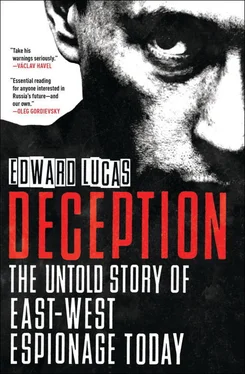That looks like petty corruption compared with the colossal sums that can be earned by diverting financial flows in energy and other businesses. Under the new system, the men who run Russia, by and large, also own it. The dividing line between public and private interests is hopelessly blurred. People who are government ministers or senior public officials in the morning are the chairmen or chief executive officers of commercial enterprises in the afternoon. Although these entities have products, managers, audited accounts, respectable bankers, shareholders and even listings on reputable foreign stock exchanges, they are not real companies in a Western sense: their managers’ aim is not to add value, raise profitability, reward shareholders and invest for the future. Instead their role is to siphon off money to insiders’ private schemes and to promote Russia’s foreign-policy agenda. The clearest example of this is in energy, where Gazprom and other natural resource companies trample on their shareholders’ interests as they pursue dubious and grandiose schemes. These companies have hugely inflated costs; they sell their oil and gas through murky intermediaries; they loot their subsidiaries (the treatment of the Gazprom pension fund is a particular scandal 22). A few brave campaigners such as Aleksei Navalny, a blogger, and the former government ministers Boris Nemtsov and Vladimir Milov, try to keep track of the looting and raise public concern against it. 23But they face intimidating lawsuits and other threats; the public seems to accept that though its interests (both Rosneft and Gazprom are partly state-owned) are being abused by the country’s elite, nothing much can be done about it.
In some respects, this landscape of power does not differ greatly from that of other corrupt, autocratically run, resentful countries with big intelligence services such as China or Iran. But in these countries the spooks are the servants of the state. In Russia, they have for the past ten years largely run it. Mr Putin, the country’s undisputed leader, spent his formative years in the KGB. His right-hand man, Igor Sechin, a deputy prime minister and tycoon in the oil and shipbuilding industries, worked in military intelligence. Another ex-spook is the head of Russian railways, Vladimir Yakunin (who is also a string-puller in intrigues involving the Baltic states). So is the head of the Defence-Industrial Commission, which oversees Russia’s arms industry, Sergei Ivanov. So is Viktor Ivanov (no relation), who heads the powerful anti-drug agency. So are numerous others at the heights of political and economic life in Russia.
In numerical terms the Siloviki are a diminishing force. Olga Kryshtanovskaya, a sociologist who specialises in monitoring their role, reckons that they comprised nearly half the top 1,000 people in the country when Mr Medvedev came to power but fell to just under a quarter by late 2010. 24Nor are they monolithic. Fights between Siloviki clans are formidable and sometimes public. In one instance a senior ex-KGB man, Viktor Cherkesov, publicly appealed in a newspaper article for a truce in a fight with a rival clan. 25In another rumble in the same row, a financier called Oleg Shvartsman gave lurid details of the way in which his fund-management company handled the $3.2bn assets of senior officials in the SVR foreign-intelligence service and FSB. 26He explained that this gave him political clout in enabling a kind of corporate raiding, in which owners could be persuaded to sell their firms for knock-down prices – these are also the tactics used to punish Mr Browder. Corruption hits the effectiveness of the security and intelligence agencies, as it does every other bit of Russian officialdom. Junior officers detest the fact that their bosses’ snouts are bigger, and deeper in the trough. Yet to focus on numbers, positions and squabbles misses the point. As Russia decays under the crushing weight of economic and social failure, the ideas the FSB stands for are becoming more powerful, not less.
From the outside, it is easy to conclude that this political arrangement cannot last. The infrastructure is crumbling, the demographic collapse accelerating and the economy is becoming obsolete. Russia is running out of people. The old cadre-factories of the Soviet Union are no longer forging the steely spooks of the Cold War. Even those minted in the later Soviet period, such as Mr Putin, are far less impressive, intellectually and operationally, than their predecessors. The great game of geopolitical competition with the West required idealism, brains and determination. Serving the Soviet Union in its declining years did not arouse the same loyalty or attract the same talents. The main motivator for those joining government service now is greed, mixed with resentment or a touch of Russian chauvinism. So it is tempting to imagine that the spookocracy will fade away with time, to the point that it will be dislodged by the growing Russian middle class, with its aspirations to live in a normal country. But the economist Mr Inozemtsev does not believe much will change. He argues:
The elite’s most important goal is the preservation of a system that enables incompetents to control the country’s wealth. Hoping that change will come when the current ruling class retires and newcomers replace them is forlorn.
He concludes that the Russian elite has ‘piratised’ one of the world’s richest countries, creating a neo-feudal system that is more stable than outsiders, plagued by wishful thinking, are willing to realise.
A big test of government is in the results it yields versus its costs. A benign autocracy may in some cases be better than a chaotic winner-takes-all political competition that leads to chaos and mob rule. It would be a mistake to dismiss the present Russian arrangement out of hand, especially at a time when political systems in Europe and America have signally failed to make the farsighted and sensible decisions that fans of parliamentary democracy believe it produces. It is easy to argue that Russia needs strong government in its transition from seven decades of totalitarianism. Western-style multiparty democracy may not suit all countries. Corruption, and an overlap with business and politics, is not confined to Russia (think of Italy under Silvio Berlusconi). As far as the role of the ex-spooks is concerned, the KGB employed some of the country’s brightest and most knowledgeable people. It would not necessarily be stupid or evil for Russia to draw on their talents now.
But in this case, such considerations do not affect the verdict: the experiment has been a spectacular failure. The regime has presided over an orgy of greed and waste, but with more than a trillion dollars of extra oil and gas revenues flooding into the country between 2000 and 2010, pitifully little has been built or repaired. The visitor may be impressed by the sleek black limousines that clog the Moscow streets, by the high-rise luxury apartments and by the glitzy shopping malls, but he will search in vain for a network of high-speed rail lines, for new world-class universities, or even for a proper arterial road linking Russia with its distant provinces on the Pacific coast. Outside Moscow and a handful of other big cities, Russia is rotting. Only the rise in bribes is impressive – by one estimate more than 164bn roubles ($6bn) is paid in kickbacks in Russia every year. 27Others would see that as a wild under-estimate. A common unscientific assumption in Russia is that roughly half the 4 trillion roubles ($140bn) in public spending is purloined.
The power relations among the self-proclaimed new nobility in Russia are shrouded in mystery. Even the most expert insiders disagree about whether Mr Putin brought in his old colleagues in order to hold on to the power he so unexpectedly gained in 1999, or whether those colleagues put him there in the first place. He certainly cut a remarkably unimpressive figure in his early months as prime minister and then president, prompting ribald jokes about his inexperience and indecisiveness that seem bizarrely misplaced in retrospect. Perhaps his grey unprepossessing demeanour was part of his KGB training in covert operations: it certainly fitted the textbook instructions for infiltration, which are to respond to scrutiny by seeming unthreatening and inconspicuous. That disarmed critics and encouraged rivals to over-reach themselves (signal examples include oligarchs such as Mr Khodorkovsky of Yukos: in retrospect, he should have challenged the president a lot earlier, or not at all). Now Mr Putin is not only the unchallenged leader of Russia. He is also (according to estimates by the CIA) one of the richest men in the world. But he does not rule alone.
Читать дальше












